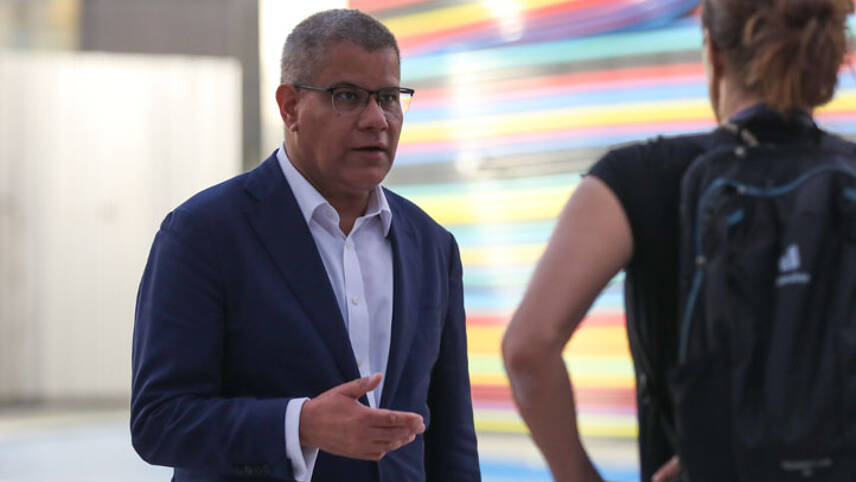Register for free and continue reading
Join our growing army of changemakers and get unlimited access to our premium content

Pictured: Sharma at COP28 in December 2023. Image: UNFCCC Flickr / Kiara Worth
He has also expressed how challenging this is likely to be, given how complex and hard-fought debates are in negotiating rooms – and bearing in mind that fossil fuels have only been explicitly mentioned in official COP agreement outcomes for two years.
Speaking at the Climate Action Innovation Zone, a side event at the UN-convened climate summit in Dubai on Wednesday (6 December), Sharma looked ahead to the event’s first and only rest day on Thursday (7 December).
He said: “I can tell you from my own experience that the COP28 Presidency team is not going to be resting. These negotiations literally carry on, very often, through the night as well.”
The COP28 Presidency team has been scrutinized ever since Dr Sultan Ahmed Al Jaber was chosen as President-Designate in Januaryv. He is the United Arab Emirates’ Special Envoy for Climate Change and its Minister for Energy and Technology. But he is also chief executive of the state-owned Abu Dhabi National Oil Corporation (ADNOC).
Some ADNOC staff reportedly had access to emails and documents regarding the organization of COP28. Moreover, Al Jaber has also been accused of trying to conduct oil deals on the sidelines of the summit, which would not be unheard of in COP history but nonetheless prompted calls for his resignation from climate activists. He has denied these claims.
Sharma gave his views on how Al Jaber’s leadership is likely to fuel heated and challenging debates in negotiating rooms.
He said: “You know, we had a big fight at the end of COP26, which you’ll remember, on coal language. We managed, for the first time in any COP… to get language on the phase-down of coal use. It took us 26 COPs to do that.
“If you’re going to cut emissions by over 40% by 2030, you are going to have to address fossil fuel usage and production. And that is a discussion that is ongoing now amongst the countries – you’ll have seen some of the texts that have emerged.
“I know that we’ve discussed carbon capture and storage (CCS)… and, of course, CCS has a role to play, particularly in the most hard-to-abate sectors. But let’s not kid ourselves that CCS is somehow going to help us cut over 40% of emissions by 2030. It’s not. So far, it’s not cheap enough and it’s not been deployed fast enough.
“Therefore, for me, language on a fossil fuel phase-out is going to be absolutely vital.”
An option for a fossil fuel phase-out is on the table, still, as are options for a phasing down. The US has pushed for the inclusion of a caveat, that only energy ‘unabated’ by CCS and efficiency improvements should be ended entirely.
Early indications from the man leading the UK in the negotiating rooms, Graham Stuart, are that Britain would support this position. The UK is notably pursuing a significant North Sea oil and gas licencing plan to expand extraction.
Critics have pointed out that this term is vague and also highlighted the lack of clear timelines.
CCS was also a hot topic at COP27 in Egypt last year. Nations including Saudi Arabia pushed for an agreement to ‘phase-down fossil fuel emissions’, which would essentially give nations the option of using CCS rather than changing their energy generation mix.
Double-speak
Al Jaber has sought to highlight his work in scaling ADNOC’s renewable energy arm, Masdar.
Within the first few days of COP28, more than 110 nations signed on to a new ‘Global Decarbonisation Accelerator’ pledge. This includes commitments to triple the world’s installed renewable energy generation capacity by 2030 and to double the annual rate of energy efficiency improvements – both visions promoted by the International Energy Agency (IEA) as crucial parts of a 1.5C-aligned net-zero transition for the global energy sector.
There are some notable absences like China and India, but the signatory base has now grown to exceed 120 nations.
Some countries, and, indeed, fossil fuel companies, are less keen on the IEA’s assertion that all upstream oil and gas projects with long lead times should be halted immediately.
Sharma said: “Yes, commitments on tripling renewables capacity by 2030. Yes, doubling the amount of energy efficiency. More hydrogen. Less methane. But the one thing that we have to understand is that 75% of all global emissions are energy-related. And that is why there is such a big push on the phase-out of fossil fuels.”
A step backward for Britain?
Sharma also emphasised the need to go beyond an initial “myriad” of announcements with tangible delivery plans. Scaling renewables so rapidly, for example, will require grid modernisation. And this will require thorough reviews of planning and incentive systems.
The UK Government, for its part, is working with energy regulator Ofgem, the National Grid and the National Infrastructure Commission on sweeping reforms to speed grid connections for renewables and energy storage.
But Sharma bemoaned Prime Minister Rishi Sunak’s recent “chopping and changing” of policies relating to low-carbon heat, energy-efficient buildings and electric vehicles for undermining business confidence.
Earlier on Wednesday, edie spoke exclusively with another Conservative MP – Net-Zero Review author Chris Skidmore. He said that while changes in the UK are unlikely to make a material change to the nation’s emissions trajectory this decade, it is sending the wrong message internationally. He warned of “an incredibly dramatic cost” if the world follows suit.


Please login or Register to leave a comment.